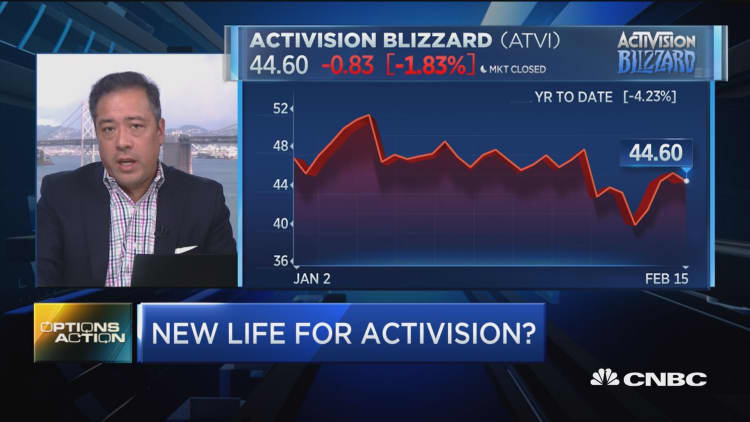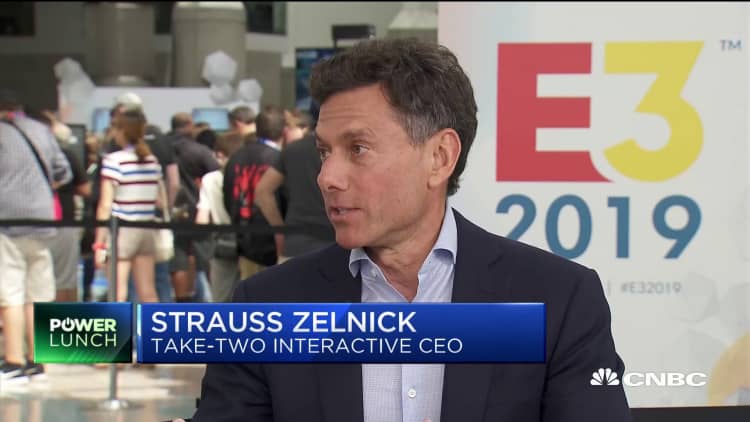Gaming company Activision Blizzard is on the road this week. Not at a giant video games convention, but at the Cannes Lions International Festival of Creativity, an event for the marketing and ad industry held on a palm tree-lined stretch of the French Riviera.
The company has a large tent by the red carpet at the Palais des Festivals, home to the Cannes Film Festival and now the Lions event, where passersby can come in for sweet treats in the "Candy Crush Saga" room (Activision Blizzard bought Candy owner King Digital for $5.9 billion in 2015), check out the trailer for the latest "Call of Duty" game or play "Overwatch," the company's esports franchise.
But Activision Blizzard isn't in Cannes just for the fans. Its chief marketing officer (CMO) for Esports Leagues, Daniel Cherry III, is on a mission to help esports go mainstream. There's still a perception that esports just means sport-based video games, rather than an activity where gamers play in front of fans in sold-out arenas, he told CNBC. Esports have their own teams and leagues, where audiences pay to attend live events to watch their favorite players battle to win big (Activision Blizzard's Overwatch League has a $5 million prize fund), and are set to generate $1.1 billion in revenue this year alone, according to estimates from Newzoo.
Activision Blizzard has around 30 staff at Cannes this year, and its tent is part of a charm offensive to educate and woo potential sponsors, which for the Overwatch League already include Coca-Cola, Toyota, T-Mobile, HP and Intel. Cherry and other marketing executives are taking part in discussions with brands, part of the Lions CLX initiative, a series that introduces brands to content publishers and tech companies.
Even though there are high-level investors such as Robert Kraft, who paid $20 million for Overwatch League team Boston Uprising, there's still a need to publicize esports to marketers and brands.
"For us, it's a coming out party of sorts to go, we're open for business," Cherry told CNBC. Oftentimes, he said, people just think of gamers as people in their bedrooms playing "Call of Duty" or "World of Warcraft," and that's a perception he needs to change.
"To have the esport opportunity bring this to life to fans all over the world, that IRL (in real life) experience is something that we want to showcase. You can get them on mobile, console, PC (and) you can also have a live experience globally with these die hard fans who spend hours a day with our games."
Cherry joined Activision Blizzard in March 2018 after a stint as CMO for the Prudential Center and New Jersey Devils, and has worked in ad agencies as well as running marketing for Diageo's North American spirits business.
It's a highly competitive industry, with Riot Games "League of Legends" 2018 World Championship finals attracting nearly 100 million unique viewers, while free-to-play Fortnite has shaken up the industry.

Cherry was attracted to the job because of the opportunity to get the company's major esports leagues — Call of Duty as well as the Overwatch League — seen by as many people in as many places as possible. And he bought into CEO Bobby Kotick's vision, he said.
"(In marketing), you continuously have ambitious people, not really thinking about others but only themselves. And this was not actually that conversation, this conversation (with Kotick) was 'our fans deserve this.' ... So my remit, candidly, was to deliver the promise to the fans at the scale scope and quality. We have a saying ... Blizzard quality, and it's not a euphemism. It literally is, good enough is not good enough."
That ambition is demonstrated by the pace at which the Overwatch franchise was developed. It was launched in 2016 and now has 20 city-based international teams, with new franchises reported to cost $25 million per team.
Cherry wants sponsors to help it build the brand, just as Sprite did for the NBA and its Slam Dunk contest. He mentions the catchphrase "Be Like Mike," introduced in a 1992 commercial celebrating Michael Jordan. "That didn't come from the NBA, that didn't come from Nike, that came from Gatorade. (Brands) can elevate the platform around their players, we're looking for our brand partners to help us do that as well," Cherry told CNBC.
The demographics for Overwatch skew younger than traditional sports, with a median age of 24 to 26, which represents an opportunity for new fan "rituals, that will keep people interested," Cherry said. His aim is to make esports "forever sports," he said. "In America, you had a time where a horse race was the top sport in the country, then it was boxing, then it was baseball. And yes you have a fan base that grows with them but it evolved over time. So the beauty of gaming is ... we are always developing something new and we don't get stuck in our ways," he said.

Just as with NBA sponsorships, there are different levels of partnership, from the professional to the college campus teams and casual online gamers.
Fortnite, the hugely successful free-to-play game published by Epic Games, isn't off-topic. "It's not an F-word here, we're all friends. We truly believe that a rising tide lifts all boats," Cherry said.
But he added that comparing his company's games with Fortnite is almost like suggesting soccer and cricket are similar. "Just like traditional sports, Fortnite in our minds is a different sport. Yes. It's not generically esports when you say sports ... All esport fans aren't the same. The same way you wouldn't talk about sports fans and assume you know how to market soccer (in the same way as) basketball."

